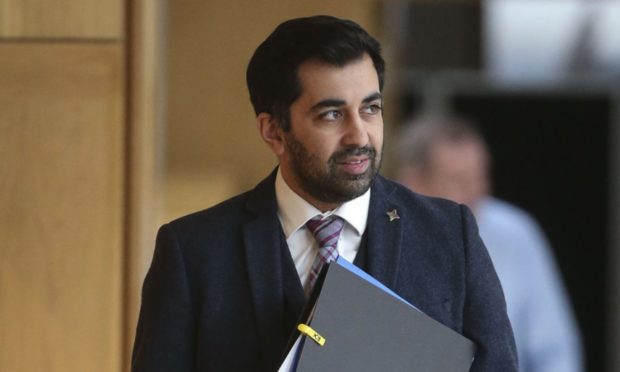Controversial plans to make it easier to change gender have been ditched as the Scottish Government abandoned flagship legislation to focus efforts on tackling the coronavirus.
Ministers halted work on the Gender Recognition Reform (Scotland) Bill and delayed the introduction of new benefits as they performed a dramatic U-turn on their plans to hold trials without juries during the pandemic.
The about-turn came just hours after lawyers and opposition politicians expressed outrage at plans that would have enabled judges and sheriffs to deliver verdicts in serious criminal cases.
Justice Secretary Humza Yousaf said it was not a time to be “bullish, nor a time for egos or petty partisanship” as he acknowledged the plan did not have the support of parliament.
Mr Yousaf removed the provision that would have allowed the parliament to enable juryless trials as MSPs considered a raft of emergency powers to help the country tackle the crisis. MSPs will meet again after the Easter recess to decide how to meet the challenges facing the criminal justice system.
MSPs tonight unanimously passed the Coronavirus (Scotland) Bill, granting emergency powers to combat the virus, with all 80 MSPs in the Holyrood chamber backing it.
The jury trial volte-face was earlier welcomed by Tory justice spokesman Liam Kerr, who said: “Ditching hundreds of years of convention in Scottish courts, when no other democracy was considering this, was clearly a step significantly too far.
“The move could also have had very damaging consequences for victims, especially those of sexual assaults, and indeed may even have lengthened their ordeal.”
With some MSPs self-isolating, a slimmed-down Holyrood reconvened for the day to debate and vote through the emergency powers.
The powers include the ability to release prisoners early if jails are made unsafe by the coronavirus as well as new powers to protect tenants against eviction for six months. Housing minister Kevin Stewart said landlords who carry out illegal evictions could end up facing a £10,000 fine.
The altered package of emergency powers was unanimously passed after negotiations between the parties on a day that also saw the Scottish Government announce that some of its flagship legislation is to be abandoned.
On benefits, Social Security Secretary Shirley-Anne Somerville said the new Scottish replacement for Personal Independent Payments (PIP) could not be introduced because it required a new service to be set up.
Similarly, the Scottish Child Payment to help families on low incomes has been postponed. The UK Government’s Department for Work and Pensions will continue to provide payments until the new benefits can be introduced.
Opposition attempts to overturn government plans to extend deadlines for public bodies responding to Freedom of Information requests failed narrowly.
Some bills that the government decides to pause now are in all probability not going to be able to be restarted in the present parliamentary session. Other bills which we had previously hoped to deliver will not now be introduced.”
Graeme Dey MSP
Several votes on amendments opposed to the plan to extend the deadline from 20 days to 60 days ended in a tie, but were rejected on the Presiding Officer’s casting vote.
Parliament Minister Graeme Dey confirmed that legislation giving councils powers to impose a tourism tax will be stopped.
Also ditched was the reform of gender recognition legislation, a proposal which has caused division within the SNP.
The Bill would have enabled trans people to receive a Gender Recognition Certificate through self-declaration after six months rather than requiring medical evidence and a two-year period of living as that gender under the current rules.
Last year a group of prominent SNP politicians, including Finance Secretary Kate Forbes and Joanna Cherry QC, signed a letter challenging the legislation and urging the government not to “rush” into making the changes.
Critics of the proposal claim women and girls could fall victim to predatory men or lose access to single-sex services.
Mr Dey said the “practical impact” of the coronavirus was that the government would not be able to deliver all its legislation.
“Some bills that the government decides to pause now are in all probability not going to be able to be restarted in the present parliamentary session,” Mr Dey said. “Other bills which we had previously hoped to deliver will not now be introduced.”
Other bills affected included legislation to tighten the foxhunting ban, the Circular Economy bill to crack-down on littering and end the throw-away culture and the Good Food Nation bill to encourage good eating.
Here is a list of the Scottish Government bills which have become victims of the coronavirus outbreak:
Gender Recognition Bill
This would have allowed trans people to receive a Gender Recognition Certificate through self-declaration after six months. This is a relaxation of current rules which require medical evidence and a two-year period of living as that gender under the current rules.
Transient Visitor Levy
This would have given local authorities the power to impose a “tourist tax” to raise income.
Good Food Nation
This was a proposal to work towards a nation where “people from every walk of life take pride and pleasure in, and benefit from, the food they produce, buy, cook, serve, and eat each day”.
Circular Economy
This was introduced in an attempt to end the “throw away” culture. It included measures to cut litter and waste and forms part of wider plans for a new approach to reducing, reusing and recycling materials “to help drive Scotland’s circular economy”.
Moveable Transactions
This was to update the law to help businesses raise money using moveable assets – such as plant, whisky barrels, intellectual property rights or customer debts.
Foxhunting legislation
This was legislation to close loopholes to protect foxes and other wild mammals and to tighten the foxhunting ban.

